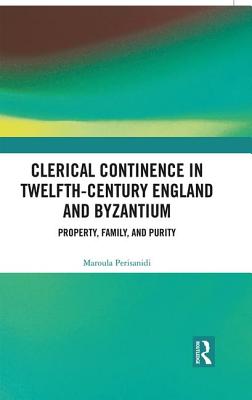Why did the medieval West condemn clerical marriage as an abomination while the Byzantine Church affirmed its sanctifying nature? This book brings together ecclesiastical, legal, social, and cultural history in order to examine how Byzantine and Western medieval ecclesiastics made sense of their different rules of clerical continence.
Why did the medieval West condemn clerical marriage as an abomination while the Byzantine Church affirmed its sanctifying nature? This book brings together ecclesiastical, legal, social, and cultural history in order to examine how Byzantine and Western medieval ecclesiastics made sense of their different rules of clerical continence. Western ecclesiastics condemned clerical marriage for three key reasons: married clerics could alienate ecclesiastical property for the sake of their families; they could secure careers in the Church for their sons, restricting ecclesiastical positions and lands to specific families; and they could pollute the sacred by officiating after having had sex with their wives. A comparative study shows that these offending risk factors were absent in twelfth-century Byzantium: clerics below the episcopate did not have enough access to ecclesiastical resources to put the Church at financial risk; clerical dynasties were understood within a wider frame of valued friendship networks; and sex within clerical marriage was never called impure in canon law, as there was little drive to use pollution discourses to separate clergy and laity. These facts are symptomatic of a much wider difference between West and East, impinging on ideas about social order, moral authority, and reform.
Get Clerical Continence in Twelfth-Century England and Byzantium by at the best price and quality guranteed only at Werezi Africa largest book ecommerce store. The book was published by Taylor & Francis Ltd and it has pages. Enjoy Shopping Best Offers & Deals on books Online from Werezi - Receive at your doorstep - Fast Delivery - Secure mode of Payment
 Jacket, Women
Jacket, Women
 Woolend Jacket
Woolend Jacket
 Western denim
Western denim
 Mini Dresss
Mini Dresss
 Jacket, Women
Jacket, Women
 Woolend Jacket
Woolend Jacket
 Western denim
Western denim
 Mini Dresss
Mini Dresss
 Jacket, Women
Jacket, Women
 Woolend Jacket
Woolend Jacket
 Western denim
Western denim
 Mini Dresss
Mini Dresss
 Jacket, Women
Jacket, Women
 Woolend Jacket
Woolend Jacket
 Western denim
Western denim
 Mini Dresss
Mini Dresss
 Jacket, Women
Jacket, Women
 Woolend Jacket
Woolend Jacket
 Western denim
Western denim
 Mini Dresss
Mini Dresss






























































